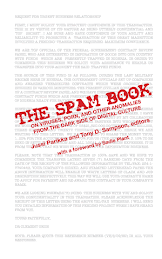More seriously, the key thing to understand about the film is that it is not about The Facebook website or the company, nor about the real people behind these networks which themselves have created a load of global internet life; not about mark zuckerbergs, sean parkers, eduardo saverins, or the usually the faceless/nameless (or first name basis only) coders and girls which seem to be essential to any successful internet company.
To me, and what I tried to see the film as, it is about how to think the mental ecology of informational and networked "social" capitalism of 21st century. What it succeeds in showing is how messy the supposedly immaterial, and logical-driven mathematical society, i.e. society of code/software, is, and how affective labour and social relations are not only the object of those internet business models, but also its driving force. Now that sounds quite anthropocentric, I admit, but actually I want to point out to the messy ontologies in which the supposedly nice and "we-all-agree-its-good-for-us" sociability is about.
After broadcast media as the driving force of 20th century media landscapes, and the at least partial message of the media system of, well, broadcasting and catering for as many eyeballs as possible (both in the advertising logic but also public broadcasting version of this logic), The Social Network seems to imply that a driving force of this system is a feeling of exclusiveness; embedded in a system of closed institutions, invitations, rank, privilege, The Social Network shows the cruelty and dark sides in celebrated utopias of open internet and celebrated social ties. Cultivating on the idea of "clubs" into a software platform and a form of high tech neotribalism suggests not only the affective logic that might be driving the addiction economy of such social media but also the exclusiveness in terms of code which suggests that there are the creative whiz-kids (elite, billionaire, white), and the end-users (hot girls with no name, or a first name, who are the psychotic end-users, but also end-products of this affective economy). Naturally such a division is far from truth, as the relations demanded by social networks aim to blur the boundaries of producers and consumers, which works towards even a more affective entanglement. Recently Jodi Dean has made interesting points about this entanglement in her Blog Theory, but earlier already Tiziana Terranova as well.
What The Social Network is consistently about is the mental ecology of sociability - and especially sociability in the age of technological networks. Code is being born of labour and money - of some people getting paid, and some not; of some people getting laid, and some not; and some people at the high end of the power law curve, some not. That is why the descriptions of affective states, and even more so the various mental disorders at the core of this film are such a clue of thinking it in terms of impersonal affects -- the affective landscape of capitalism not reducible to representational figures: paranoia, compulsion, psychosis, depression. "Social pathologies are first of all a communicational disorder", writes Franco "Bifo" Berardi in The Soul at Work, and understanding the compulsion of communication as a state where again affect and business models conflate is a key way to understand contemporary infoscapes. Look at the disorders of minds and tech, of social relations and software to understand fundamental elements of how internet and high-tech cultures in general work, and this is where the fundamental impersonality in terms of Zuckerberg-the-film-character might just become a crucial symbol of current social media capitalism in a similar manner as Daniel Plainview in There Will be Blood (2007) is emblematic of capitalism through an understanding of its zombie-like, soulless man as the "vessel of Capital" of the industrial age, to borrow Steven Shaviro's words and insightful analysis.








Great post Jussi. For me the crux is when you write that "affective labour and social relations are not only the object of those internet business models, but also its driving force."
ReplyDeleteIt is not just the conflation of 'work-play' that this entails but the multiple ontologies ('messy' and otherwise) which we inhabit. This is something Zadie Smith's widely circulating NYRB review misses. Her typology of real and substantive 'Person 1.0' versus its virtual 'Person 2.0' counterpart is wholly untenable unless you discount our ever-changing relation to technology and the concomitant media ecologies.
Surely the great insight of social networks is how they demonstrate that there is no singular ideal type of the human. Zuckerberg's genius was to functionalize an operational sequence for radically increased affective communication. That is why I see Sean Parker/Justin Timberlake as the narrative fulcrum point. Surely he is the ultimate 'friend request': once accepted the news feed of your life becomes filled with a new world of desirable social relations and wildly intensified affect, naturally amidst proliferating exclusivity and access and conspicuous consumption.
The 'realness' of this networked world was patently clear to Zuckerberg the moment his first Facemash went live. And it is why everybody now knows that what is 'cool' is a billion, not a million.
The fact that capital knows this and is largely rearticulating its relations on that basis makes it no less real in people's lives.
And, recalling 'Fragments' in the Grundrisse, while the absolute absorption of that affective communication by the machinery of capital may be a pathology, that doesn't change its modality: “as though its body were by love possessed”.